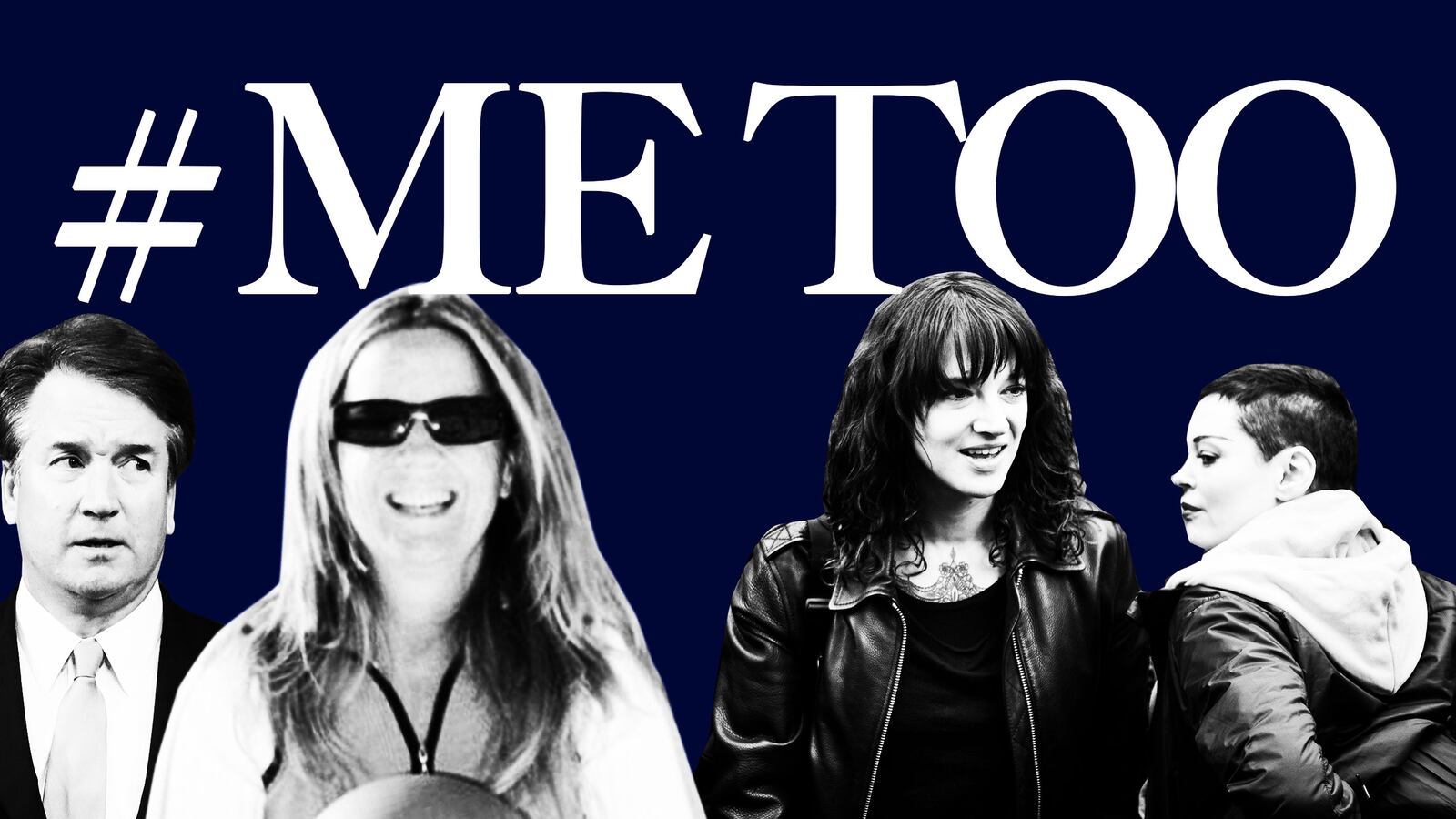It’s been about a year since the first wave of #MeToo stories changed the way we talk about sexual misconduct. But amid all the “What about the men?” hand-wringing and nervous Hollywood board meetings and sassy feminist T-shirt sportings and red carpet back-pattings, it’s hard to say we’ve made satisfactory progress. Especially if you’re Christine Blasey Ford.
Last week, Christine Blasey Ford told the Washington Post that when she was 15, a drunken 17-year-old Brett Kavanaugh held her down and attempted to rape her at a party. Christine Blasey Ford also told a therapist and her husband in 2012, a friend in 2017, and her Congressman a few months earlier this year. She says she risked everything by coming forward out of a sense of civic duty. And Brett Kavanaugh will probably become a Supreme Court justice, anyway. Yes, #HimToo.
People who didn’t want Ford’s accusation to be true came for Ford’s credibility like they’ve always come for the credibility of other accusers of other men. On one hand, it’s reasonable to expect an accusation as serious as sexual misconduct to be credible and it’s foolhardy to lend too much credence to accusations without any supporting evidence. But on the other, many of the traits that doubters say undermine an accuser’s credibility make no sense. They’ve never made sense.
Kavanaugh supporters accused Ford of being part of a political Hail Mary that aimed to snipe off a Supreme Court nomination at the last minute, despite the fact that it was the Democrats, and not Ford, who kept the accusations secret for months. They tried to smear Ford’s credibility by citing bad reviews on RateMyProfessors.com, despite the fact that getting bad reviews on a website that awards a hot pepper icon to teachers students find sexually attractive has nothing to do with telling the truth or lying—and they had the wrong Christine Ford. They pointed out that Kavanaugh’s mother, a judge, had presided over part of Ford’s parents’ case, and thus Ford was motivated by a decades-long familial grudge, despite the fact that Kavanaugh’s mother issued a favorable ruling to Ford’s parents.
Kavanaugh’s boosters have been playing all the hits in defending their guy against the woman who could ruin it all. There’s the old “What about all the women he didn’t attempt to rape?’ defense. After Ford’s allegations went public, Kavanaugh’s camp offered for the public’s consideration a letter signed by 65 women who claim that Brett Kavanaugh never sexually assaulted them, not even a little bit. Isn’t that nice? If a man has met and had conversations with, say, 2,000 women in his life and only held down and attempted to rape one of them, that’s a pretty solid percentage. Less than 1 percent of female acquaintances report attempted rapes! Not too shabby!
There’s also been the “It was a long time ago” response. I say “response” because “It was a long time ago” isn’t a defense as much as it is an implicit admission of guilt paired with an arbitrarily imposed statute of limitations as a chaser.
We’ve also heard from the “He was drinking” defense. Kavanaugh was drinking, and therefore what he did matters less. She was drinking, and therefore what she did matters more. I find it quite unfair that when a man has been drinking, he can’t be held accountable for how he behaves, but when a woman has been drinking, she’s on the hook for for not only how she behaves, but also for how every man around her behaves. Seems like a lot of responsibility for the second sex.
Detractors still accuse victims of seeking fame or attention. But accusing prominent men of sexual misconduct has never been a path to wealth or the sort of fame that generates wealth. Accusers often end up stained by sexual misconduct accusations more indelibly than the men they accuse, even if the accusers came forward reluctantly. Just look at Paula Jones and Bill Clinton. Or Anita Hill and Clarence Thomas. I struggle to think of a single beloved female public figure who got her start by accusing a man of sexual misconduct. I can think of several whose lives and careers were sidelined or forever defined by what was done to them, and I know there must be thousands of others whose names I’ll never know. If Christine Ford is attempting to go from accuser to America’s sweetheart, against all the odds, she’d be the first woman in history to do so. What a moonshot that would be.
Imperfect victimhood leads to a gleeful celebration of those imperfections as victories for misogyny and losses for feminism. It’s disturbing. When Rose McGowan was indicted for cocaine possession earlier this year, some right-wing thought leaders crowed, as though McGowan having drugs meant that sexual abuse as a concept didn’t exist, or didn’t exist for her. When news reports revealed that Asia Argento had settled her own sexual misconduct suit, some on the right acted as though that meant that it wasn’t possible that she had also been a victim of rape. Personal flaws in victims are often held up as reasons to discredit the very concept of victimhood or at least move the goalposts so far downfield that to be a real survivor is as unobtainable as sainthood.
Meanwhile, men rise to the tops of their fields even after sexual misconduct allegations. One of them is currently the president. They’ve won Oscars, Emmys, Grammys. Plenty of men who have used their power to hurt women own restaurants and manage retail stores and inflict their own brand of terror away from coastal media centers and their commensurate media megaphones. Public tskings are more common now than they once were, but some of the most prominent men to have their misdeeds exposed last year are already trying to mount comebacks.
Real progress is in sussing out institutionally-sanctioned sexual violence has been much slower than the splashy #MeToo headlines and photo ops would lead one to believe. Some powerful men have lost overall deals or board seats, but less than a year from the first round of #MeToo stories, origins of the misogyny that led to this problem in the first place go unchecked. Unless we kill it at the root, it will keep growing back. And it matters more than one seat on the Supreme Court.
Stories like Christine Blasey Ford’s—stories of jerks at parties holding them down or groping them or worse—are more common than optimistic progressives would like to admit. Most of those stories stay private. Some of them advance to being told to confidants. Fewer still become stories that get swapped with other women over drinks, like sick trading cards, or become part of the “whisper networks” that women relied on to warn each other privately about creeps in their industries. And the fewest still ever become public, even now. That’s because, even in the #MeToo era, we still punish victims for not being perfect and excuse the powerful who act like monsters. The misogyny at the root of gender inequality directs the way we respond to high-profile cases of misconduct like gravity. It’s everywhere, it’s invisible, and it’s inescapable.





